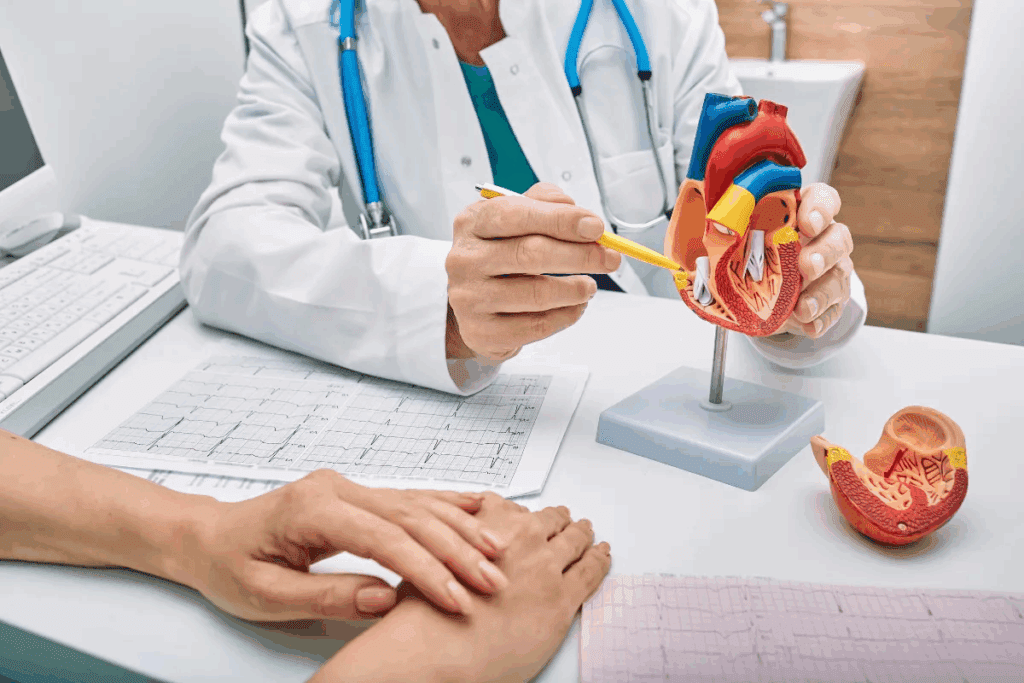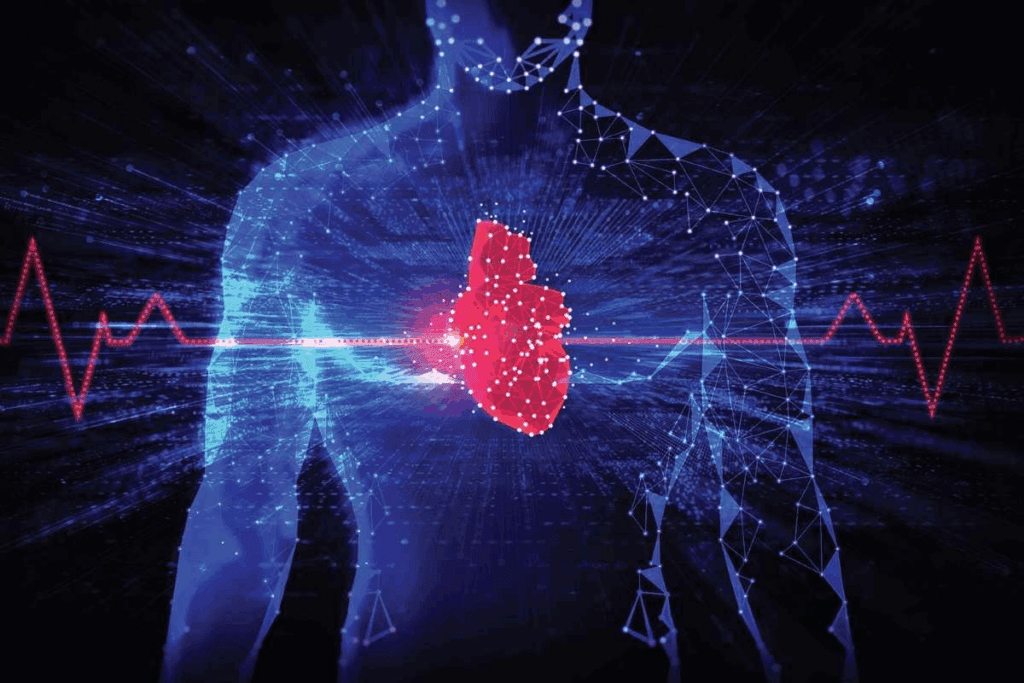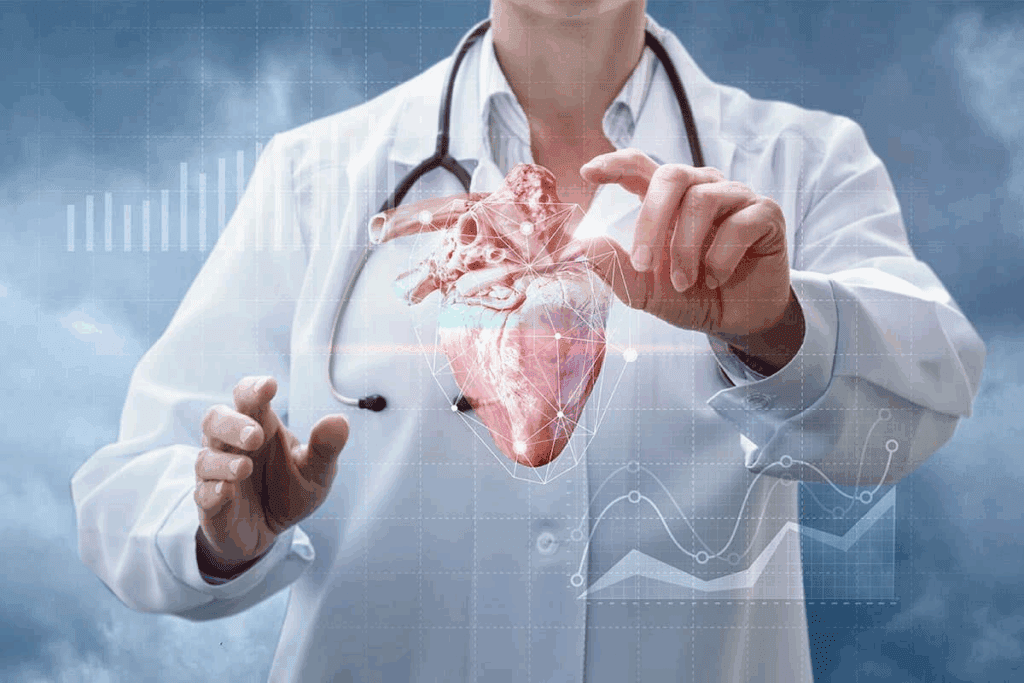Last Updated on November 25, 2025 by Ugurkan Demir

Learn what does cardiology focus on, key roles in heart treatment, and the path to becoming a specialist. A cardiologist is a doctor who deals with heart and blood vessel diseases. They help with serious issues like heart failure and high blood pressure. This is very important for our health.
Cardiologists use special tests like echocardiograms to check the heart. They also do procedures to fix problems. This way, they give us the best care for our hearts.
At Liv Hospital, our cardiologists focus on you from start to finish. They know how critical heart health is. So, they work hard to give you top-notch care.

Cardiology is a key part of medicine. It deals with heart and blood vessel problems. It’s very important because heart diseases are a big cause of death worldwide.
Cardiology studies heart issues, like what causes them and how to treat them. It includes everything from keeping people healthy to doing complex surgeries. Cardiologists are doctors who focus on heart health. They use tests and treatments to help patients.
Cardiology covers a lot of ground. It includes:
In today’s healthcare, cardiology is essential. Heart diseases are common, and cardiologists help manage them. They treat current problems and teach patients how to stay healthy.
Cardiology is important in many ways:
By focusing on these areas, cardiology helps a lot. It makes a big difference for people and healthcare systems.

Cardiology is all about keeping the heart healthy. It includes diagnosing, treating, and preventing heart problems. Cardiologists are experts who deal with heart and blood vessel issues.
Cardiologists play a big role in finding heart problems. They use tests like echocardiograms and electrocardiograms (ECGs) to see how the heart works. These tests help spot diseases like heart failure and irregular heartbeats.
Spotting heart issues early is key. It helps doctors treat them better and sooner.
Cardiologists also focus on treating heart diseases. They create treatment plans that fit each patient. This might include changing lifestyle habits, taking medicine, or doing procedures.
For example, people with heart blockages might get advice on eating better and exercising. Doctors might also prescribe drugs to help manage symptoms. In serious cases, they might do angioplasty or coronary artery bypass grafting (CABG).
Preventing heart disease is a big part of cardiology. Cardiologists teach patients how to stay heart-healthy. This includes eating right, exercising, and quitting smoking.
By focusing on prevention, cardiologists help patients avoid heart disease. Regular check-ups and tests are important for keeping the heart healthy.
A cardiologist’s day is packed with clinical duties, patient talks, and tests. They work in hospitals, clinics, and private offices. Their tasks include checking patient records, doing procedures, and talking with other doctors.
Cardiologists handle many important tasks for patient care. These include:
They need technical skills and a deep understanding of heart diseases.
Talking with patients is a big part of a cardiologist’s job. During these talks, they:
Diagnostic tests are key for diagnosing heart diseases. Cardiologists perform many tests, including:
| Procedure | Description | Indications |
| Echocardiogram | An ultrasound test that uses sound waves to create images of the heart | Assess heart function, valve disease, and congenital heart defects |
| Electrocardiogram (ECG) | A test that measures the electrical activity of the heart | Diagnose arrhythmias, ischemia, and other heart conditions |
| Stress Test | A test that monitors the heart’s activity during physical stress | Evaluate coronary artery disease and assess cardiac function |
These tests help cardiologists diagnose and manage heart conditions better, leading to better patient care.
Cardiologists are key in managing heart conditions that affect millions. They handle a wide range of heart diseases. This requires detailed care and treatment plans.
Coronary artery disease (CAD) is a common heart issue. It happens when the heart’s blood supply gets blocked. This can cause angina, heart attacks, and more. Treatments include lifestyle changes, medicines, and procedures like angioplasty.
Heart failure means the heart can’t pump enough blood. It’s caused by things like CAD, high blood pressure, and diabetes. Cardiologists use medicines, lifestyle changes, and devices like pacemakers to manage it.
Arrhythmias are irregular heartbeats. They can be too fast, too slow, or uneven. Cardiologists use tests and treatments like catheter ablation to fix them.
Hypertension, or high blood pressure, is a big risk for heart disease. Cardiologists help manage it with diet, exercise, and medicine. This can prevent heart failure, CAD, and stroke.
Cardiologists are essential in treating these heart conditions. They improve patient outcomes and quality of life.
To find heart diseases, cardiologists use many tests and procedures. These tools help check the heart’s health. They let doctors find and treat heart problems well.
Non-invasive tests are key in cardiology. They give important info without surgery. Here are some common ones:
When non-invasive tests don’t give enough info, cardiologists use invasive methods. These include:
By using both non-invasive and invasive tests, cardiologists get a full picture of a patient’s heart. This helps them make better treatment plans and improve health outcomes.
Becoming a cardiologist is a long and challenging journey. It requires a lot of education. We will cover the main steps, from college to medical school and beyond.
The first step is a strong undergraduate education. Most future cardiologists get a bachelor’s degree in a science like biology, chemistry, or physics. A rigorous undergraduate program with science and math courses is key. It’s also good to do research or internships to get practical experience.
After college, the next step is medical school. Here, you earn a Doctor of Medicine (M.D.) or Doctor of Osteopathic Medicine (D.O.) degree. Medical school lasts four years, with both classroom learning and clinical training. Clinical rotations in the last two years give you real-world experience in cardiology and other specialties. Medical school is a vital part of becoming a cardiologist.
After medical school, you need a medical license to practice. You must pass the United States Medical Licensing Examination (USMLE) or the COMLEX series. Licensure requirements differ by state, so check the rules for where you want to work. Keeping your license means ongoing education and following professional standards.
In short, becoming a cardiologist takes a lot of education and training. It starts with a strong college foundation, then medical school, and ends with a medical license. We’ve outlined the main educational steps for those aiming for this career.
To become a cardiologist, one must go through a lot of training. This includes internal medicine residency and cardiology fellowship programs after medical school. This training is key to learning how to diagnose and treat heart problems.
The first part of this training is an internal medicine residency, lasting three years. Here, future cardiologists learn to handle many adult medical issues. They also improve their skills in procedures. This training is vital for the specialized training that comes next.
After the internal medicine residency, cardiologists enter a cardiology fellowship. This can take three to four years. It focuses on cardiology, teaching deep knowledge in heart diseases. Fellows work with experienced cardiologists, improving their skills in many procedures.
There are also options for more specialized training in cardiology. These include interventional cardiology, electrophysiology, and heart failure and transplant cardiology. These programs help cardiologists become experts in certain areas, improving patient care.
By finishing these tough training programs, cardiologists are ready to meet the complex needs of their patients. They can offer detailed and caring treatment.
Becoming a board-certified cardiologist takes hard work and a love for learning. Medical science and technology keep changing. Cardiologists must keep up to give their patients the best care.
To get certified, cardiologists need to finish their education and training. This includes internal medicine residency and cardiology fellowship. They also have to pass a test given by a board like the American Board of Internal Medicine (ABIM).
Key components of the certification process include:
To keep their certification, cardiologists must keep learning. They need to stay up-to-date with new research and treatments. This helps them give top-notch care and keep up with field changes.
The maintenance process typically involves:
Cardiologists must always be learning to keep up with new discoveries in heart medicine. They do this by going to conferences, taking workshops, and doing research. This way, they can improve their skills, help the field grow, and care for their patients better.
By getting and keeping their certification, cardiologists show they are committed to excellence. This not only helps their patients but also moves the field of cardiology forward.
Cardiology is a complex field with many subspecialties. Each one deals with different heart issues. This allows cardiologists to give focused care, improving patient results.
Interventional cardiology uses small procedures to treat heart diseases. Angioplasty and stenting are common. They help keep blood flowing to the heart.
Electrophysiology treats heart rhythm problems, or arrhythmias. Advanced techniques are used to study and fix the heart’s electrical system.
This area focuses on heart failure, where the heart can’t pump enough blood. It also covers heart transplant care. Cardiologists here give full support to patients.
“The management of heart failure requires a multidisciplinary approach, involving not just cardiologists but also other healthcare professionals.”
— Medical Expert, Cardiologist
Pediatric cardiology handles heart issues in children. This includes congenital defects and other heart diseases. Specialized care is given to help young patients.
Cardiology’s subspecialties show its diversity and need for specialized knowledge. By focusing on specific areas, cardiologists can offer better care. This helps in treating heart diseases more effectively.
Successful cardiologists need advanced technical skills and great people skills. They also need the physical and mental strength for a tough job. They must be able to diagnose and treat complex heart problems well.
Cardiologists must have a solid base in technical skills. These include:
Having advanced technical skills is key to accurately diagnosing heart diseases and creating the right treatment plans.
| Technical Skill | Description | Importance |
| Echocardiography | Ultrasound technology to image the heart | High |
| Electrocardiography (ECG) | Recording the electrical activity of the heart | High |
| Cardiac Catheterization | Invasive procedure to diagnose and treat heart conditions | High |
Cardiologists need to be good at talking to patients, understanding their needs, and caring for them. Key skills include:
These skills help build trust with patients and ensure they get the best care.
Cardiologists often work long hours, needing both physical and mental strength. This includes:
Keeping up physical and mental stamina is key to providing top-notch patient care.
As the world’s population ages, the need for cardiologists is rising. This growth is due to more heart disease and better cardiac care. It opens up many career paths in cardiology.
The job market for cardiologists is strong. This is because more people are getting older and heart disease is becoming more common. Experts predict that the demand for cardiologists will keep going up.
Key Trends:
Cardiologists are among the top earners in medicine. Their salaries depend on where they work, how long they’ve been practicing, and their experience.
| Work Setting | Average Salary Range |
| Hospital | $400,000 – $600,000 |
| Private Practice | $500,000 – $700,000 |
| Research Institution | $350,000 – $550,000 |
Note: Salary ranges are approximate and can vary based on numerous factors including location and experience.
Cardiologists can work in hospitals, clinics, private practices, and research institutions. Each place offers different chances and challenges.
Cardiologists have many career options in various settings. Each setting has its own benefits and drawbacks. The choice depends on personal preferences, career goals, and lifestyle.
We’ve looked at how cardiologists diagnose and treat heart issues. They also focus on preventing heart problems. Their work is key in today’s healthcare world.
To become a cardiologist, one must go through a lot. This includes getting an undergraduate degree, medical school, and then residency and fellowship. Getting certified and staying updated is also vital for their career.
Cardiologists need many skills, like technical ones and good communication. They also need to be physically and mentally strong. It’s clear they are essential for keeping our hearts healthy.
Choosing to be a cardiologist is a big commitment. But it’s a chance to really help people. It’s a fulfilling career that can change lives.
A cardiologist is a doctor who focuses on heart and blood vessel health. They diagnose and treat heart problems.
Cardiologists check and fix heart issues. They do tests and give care to prevent heart diseases.
To be a cardiologist, you need to finish college, go to medical school, and do residency and fellowship. You also need to get certified.
Cardiology has many areas like interventional cardiology and electrophysiology. There’s also heart failure and transplant cardiology, and pediatric cardiology.
Cardiologists use tests like echocardiograms and electrocardiograms. They also do angiograms and cardiac catheterization.
Cardiologists treat heart diseases like coronary artery disease and heart failure. They also handle arrhythmias and high blood pressure.
Good cardiologists need technical skills and can work well with people. They also need stamina to handle the job’s demands.
Cardiologists have a bright future. They can work in hospitals, clinics, or private practice. They earn a good salary.
It’s very important for cardiologists to keep learning. This helps them stay current, keep certifications, and care for patients well.
Cardiology is key in healthcare today. It helps with heart issues, preventive care, and keeping the heart healthy.
Cardiology is the study of heart and blood vessel diseases. It involves diagnosis, treatment, and prevention.
Cardiologists study the heart and blood vessels. They diagnose and treat heart problems and give preventive care.
Subscribe to our e-newsletter to stay informed about the latest innovations in the world of health and exclusive offers!